英国文学之18世纪
18世纪英国文学的特点
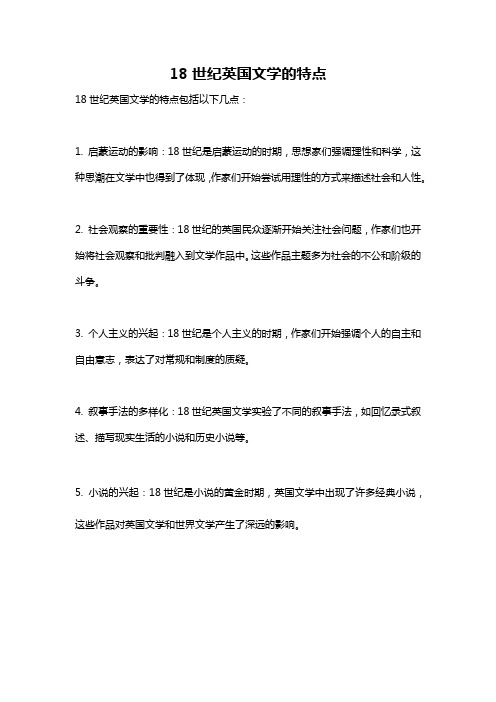
18世纪英国文学的特点
18世纪英国文学的特点包括以下几点:
1. 启蒙运动的影响:18世纪是启蒙运动的时期,思想家们强调理性和科学,这种思潮在文学中也得到了体现,作家们开始尝试用理性的方式来描述社会和人性。
2. 社会观察的重要性:18世纪的英国民众逐渐开始关注社会问题,作家们也开始将社会观察和批判融入到文学作品中。
这些作品主题多为社会的不公和阶级的斗争。
3. 个人主义的兴起:18世纪是个人主义的时期,作家们开始强调个人的自主和自由意志,表达了对常规和制度的质疑。
4. 叙事手法的多样化:18世纪英国文学实验了不同的叙事手法,如回忆录式叙述、描写现实生活的小说和历史小说等。
5. 小说的兴起:18世纪是小说的黄金时期,英国文学中出现了许多经典小说,这些作品对英国文学和世界文学产生了深远的影响。
18世纪英国文学(1)

第二节18世纪英国文学一、概述在世纪初,现实主义小说登上文坛,在长达五十余年的发展中,产生了笛福、斯威夫特、理查逊、菲尔丁、高尔斯密、斯泰恩等一批出色的小说家,它代表18世纪英国文学的最高成就,也使英国文学在整体上达到欧洲同一时期的最高水平。
18世纪中后期,具有感伤主义色彩的墓园诗派出现繁荣局面,哥特式小说也展露异彩。
18世纪后期,彭斯和布莱克的诗歌唱了浪漫主义先声。
启蒙主义是18世纪英国文学的思想主轴。
18世纪英国启蒙文学具有发展的特点。
前期相信理性的绝对权威,力图在现存社会结构内树立美德,创造自由。
英国启蒙文学发生在资产阶级革命之后,它所面临的主要任务是全面确立资本主义社会的伦理规范。
三、现实主义小说与戏剧1、产生背景:(1)哲学基础;(2)印刷技术的改进与廉价读物的出现;(3)大量普通读者出现。
2、丹尼尔·笛福(Daniel Defoe, 1660-1731)及《鲁滨逊漂流记》(Robinson Crusoe, 1719)《鲁滨逊漂流记》写鲁宾逊在海外荒岛的冒险开拓经历,那种试图单枪匹马与未知世界斗争的开拓本能,敢于挑战极限的精神,开天辟地的气魄和勇气宣示了个人英雄主义时代的来临。
3、撒姆尔·理查逊(Samuel Richardson, 1689-1761)有书信体小说《帕米拉》(Pamela, 1739-1740),以及小说《克莱丽莎》(Clarissa, 1747-1748)。
《帕米拉》:贵族B先生、女仆帕米拉。
小说中对阶级关系的处理方式:两个阶层各守其职,以此为基础建立起来稳定的社会结构。
新道德的基础是建立在阶级划分、阶级容忍、阶级合作以及理性基础上的。
小说的书信体结构。
5、亨利·菲尔丁(Henry Fielding, 1707-1754)的主要小说:《大伟人江奈生·魏尔德传》(The Life and Death of Jonathan Wild the Great, 1739-1740)、《约瑟·安德鲁传》(The Adventures of Joseph Andrews and his Friend, Mr. Abraham Adams, 1742)、《汤姆·琼斯》(Tom Jones, 1749)、《亚美丽娅》(Amelia, 1751)等。
18世纪英国文学的趋势

18世纪英国文学的趋势
18世纪是英国文学发展的重要阶段,其中出现了一些明显的趋势和特点。
以下是一些重要的趋势:
1. 古典主义:18世纪英国文学受到古典文学的强烈影响,特别是古希腊和罗马文学。
作家们研究和模仿古典作品的风格和主题,追求文学的严谨和规范性。
2. 启蒙思想:18世纪是启蒙时代的全盛期,思想家们强调理性和科学的重要性,反对迷信和专制。
这种思潮在文学中也有所体现,作家们开始关注社会问题、人权和个人自由。
3. 社会批判:18世纪英国社会出现了巨大的变革,人们开始对社会问题展开批判。
一些作家,如塞缪尔·理查森和亨利·菲尔丁,通过小说探讨了社会阶级、性别和家庭关系等问题。
4. 英国浪漫主义:18世纪末,浪漫主义逐渐兴起,对理性主义和古典主义的反叛开始显露。
浪漫主义作家,如威廉·华兹华斯和塞缪尔·柯勒律治,强调个人情感和自然的力量。
5. 小说的兴起:18世纪是英国小说发展的重要时期。
小说成为一种流行的文学形式,作家们开始创作长篇小说,如丹尼尔·笛福的《鲁滨逊漂流记》和简·奥斯汀的《傲慢与偏见》。
6. 诗歌的转变:18世纪的英国诗歌呈现出一种转变,由古典的形式
和主题向更加个人化和自由的方向发展。
诗人们开始关注个人情感和自然景观,并采用更加自由的诗体,如威廉·布莱克的无韵诗。
总的来说,18世纪英国文学在古典主义和启蒙思想的影响下,开始关注社会问题和个人情感,同时也为后来浪漫主义和小说的兴起铺平了道路。
18世纪英国文学的主要成就

18世纪英国现实主义文学
小说是18 世纪英国文学最主要的贡献.在古典主义盛行时期,史诗和悲剧才是正统文学作品的形式.小说是随着中产阶级的兴起而兴起的新的文体.西班牙的“流浪汉小说”、骑士传奇、意大利的以《十日谈》为代表的短篇故事、英国的描写下层人物冒险经历的故事和人物特写,都是形成近代小说的重要因素.
特点是:①它偏重对现实的客观的、具体的、历史的描写,强调人物和环境之间的现实关系.
②典型是现实主义创作的核心.典型化和个性化不可分割,每个典型又是“这一个”.③具有强烈的批判性或揭露性,特别注重描绘社会的黑暗和丑恶现象,以及社会下层、“小人物”的悲惨遭遇.④在艺术形式和表现手法上,以生活本身的形式反映生活为其基本形式,但不局限于这一形式.它具有广阔的审美可能性,不排除采用假定、夸张、荒诞、变形、意识流等多种手法.它重视社会分析,包括心理分析.探索人的复杂内心世界的心理描写,是它的艺术特征之一.
⑤思想基础一般为资产阶级的人道主义.谴责社会黑暗,同情下层人民的苦难与不平等地位,但一般未触及社会矛盾和现实关系的真正根源.
成就:①笛福与《鲁滨逊飘流记》;②斯威夫特与《格列佛游记》;③理查生与《克拉丽莎》;
④菲尔丁与《汤姆.琼斯》.。
英国文学——18世纪概述

启蒙时期文学(17世纪后期—18世纪中期)1688年的“光荣革命”推翻复辟王朝,确定了君主立宪制,建立起资产阶级和新贵族领导的政权,英国从此进入一个相对安定的发展时期。
18世纪初,新古典主义成为时尚。
新古典主义推崇理性,强调明晰、对称、节制、优雅,追求艺术形式的完美与和谐。
亚历山大·蒲柏(Alexander Pope, 1688-1744)是新古典主义诗歌的代表,他模仿罗马诗人,诗风精巧隽俏,内容以说教与讽刺为主,形式多用英雄双韵体,但缺乏深厚感情。
18世纪英国散文出现繁荣,散文风格基本建立在新古典主义美学原则之上。
理查德·斯梯尔(Richard Steele, 1672-1729)与约瑟夫·艾迪生(Joseph Addison, 1672-1719)创办《闲谈者》(Tatler)与《观察者》(Spectator)刊物,发表了许多以当时社会风俗、日常生活、文学趣味等为题材的文章,他们清新秀雅、轻捷流畅的文体成为后人模仿的典范。
乔纳森·斯威夫特(Jonathan Swift, 1667-1745)是英国文学史上最伟大的讽刺散文作家,他的文风纯朴平易而有力。
斯威夫特的杰作《格列佛游记》(Gulliver's Travels)是一部极具魅力的儿童故事,同时包含着深刻的思想内容。
作者通过对小人国、大人国、飞岛国、慧马国等虚构国度的描写,以理性为尺度,极其尖锐地讽刺和抨击了英国社会各领域的黑暗和罪恶。
塞缪尔·约翰逊(Samuel Johnson, 1709-1784)是18世纪英国人文主义文学批评的巨擘,《莎士比亚戏剧集序言》(The Preface to Shakespeare)和《诗人传》(Livesof the Poets)是他对文学批评作出的突出贡献。
他从常识出发,在某些方面突破了新古典主义的框框,不乏真知灼见。
约翰逊的散文风格自成一家,集拉丁散文的典雅、气势与英语散文的雄健、朴素于一体。
十八世纪英国文学概述
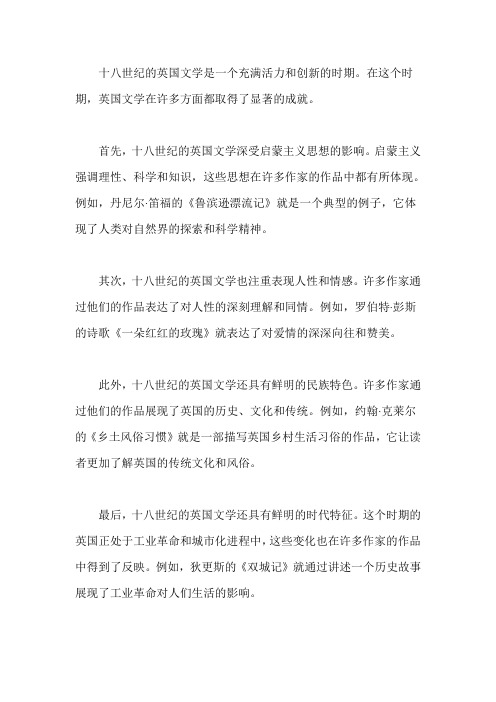
期,英国文学在许多方面都取得了显著的成就。
首先,十八世纪的英国文学深受启蒙主义思想的影响。
启蒙主义强调理性、科学和知识,这些思想在许多作家的作品中都有所体现。
例如,丹尼尔·笛福的《鲁滨逊漂流记》就是一个典型的例子,它体现了人类对自然界的探索和科学精神。
其次,十八世纪的英国文学也注重表现人性和情感。
许多作家通过他们的作品表达了对人性的深刻理解和同情。
例如,罗伯特·彭斯的诗歌《一朵红红的玫瑰》就表达了对爱情的深深向往和赞美。
此外,十八世纪的英国文学还具有鲜明的民族特色。
许多作家通过他们的作品展现了英国的历史、文化和传统。
例如,约翰·克莱尔的《乡土风俗习惯》就是一部描写英国乡村生活习俗的作品,它让读者更加了解英国的传统文化和风俗。
最后,十八世纪的英国文学还具有鲜明的时代特征。
这个时期的英国正处于工业革命和城市化进程中,这些变化也在许多作家的作品中得到了反映。
例如,狄更斯的《双城记》就通过讲述一个历史故事展现了工业革命对人们生活的影响。
时期的英国文学在许多方面都取得了显著的成就,为世界文学的发展做出了重要贡献。
十八世纪英国文学的分类

十八世纪英国文学的分类十八世纪是英国文学的黄金时期,这一时期涌现出了许多杰出的作家和作品。
这些作品被广泛地分为几类,如小说、诗歌、戏剧等。
以下是对十八世纪英国文学的分类的探究。
一、小说在十八世纪,小说成为了最为流行的文学形式。
小说包含了丰富的内容和不同的风格。
其中,浪漫小说和现实主义小说是最为流行的两种类型。
浪漫小说通常描写一些奇异的事件和情节,其中最著名的作品是简·奥斯汀的《傲慢与偏见》和《理智与情感》。
这些小说通常描写了一个女性主角的故事,她在不同的环境中经历了各种各样的情感和爱情。
现实主义小说则更加注重现实生活中的事件和情节,其中最著名的作品是丹尼尔·笛福的《鲁滨逊漂流记》。
这些小说通常描写了一个男性主角的故事,他在不同的环境中经历了各种各样的挑战和困境。
二、诗歌十八世纪的诗歌涵盖了许多不同的流派,包括浪漫主义、启蒙主义和古典主义。
其中最著名的作品是威廉·华兹华斯的《悼念诗》和约翰·基茨的《抒情诗集》。
浪漫主义诗歌通常描写一些浪漫和情感的主题,如爱情、自然和宗教。
这些诗歌通常使用比喻和象征来表达作者的情感和思想。
启蒙主义诗歌则更加注重理性和科学的主题,如自然、人类和社会。
这些诗歌通常使用清晰和明确的语言来表达作者的观点和思想。
古典主义诗歌则更加注重传统和历史的主题,如希腊和罗马神话。
这些诗歌通常使用优美和华丽的语言来表达作者的情感和思想。
三、戏剧十八世纪的戏剧涵盖了许多不同的类型,包括喜剧、悲剧和历史剧。
其中最著名的作品是威廉·莎士比亚的《哈姆雷特》和奥利弗·戈德史密斯的《船长》。
喜剧通常描写一些轻松和幽默的主题,如爱情和友谊。
这些戏剧通常使用滑稽和夸张的手法来吸引观众的注意力。
悲剧则更加注重人性的悲剧和悲惨的结局,如爱情和家庭。
这些戏剧通常使用严肃和深刻的手法来表达作者的情感和思想。
历史剧则更加注重历史和政治的主题,如战争和国家。
18世纪的英国文学

《汤姆·琼斯》的价值就在于用一个烂 熟的套路广泛地描绘了英国的社会生活。
(四)劳伦斯·斯泰恩
斯泰恩是英国感伤主义文学的代表作家, 他的小说对世界文学都有重要的作用,代表 作是《感伤的旅行》。
英国的感伤主义发展到斯泰恩已经形成 一个大的浪潮,感伤主义的名称即因斯泰恩 的小说《感伤的旅行》而确定下来。
很多人认为英国的感伤主义是从理查逊 开始的。
理查逊的小说里也有大量议论的部分。 有些议论被人斥为是“自满自足的中产阶级 的道德说教”。
理查逊小说中细腻的感情分析成为英国 小说中重要的倾向,他还创造了“书信体” 小说。
理查逊小说的整体格调是哀婉的。
(三)亨利·费尔丁
亨利·费尔丁是18世纪英国很有影响的 小说家,他的创作很丰富。最早的小说是 《约瑟·安德鲁斯》,是针对《帕美拉》的 感伤情调写的反讽,费尔丁把它叫做“散文 滑稽史诗”,是对当时以理查逊为代表的作 家创作的一系列感伤小说的讽刺。
(五)约拿旦·斯威夫特
约拿旦·斯威夫特(1667-1745)在文学 史上有独特的地位,代表作是《格列佛游 记》。
《格列佛游记》一共分为四部分:第一 部分叫“小人国”;第二部分叫“大人国”; 第三部分叫“飞岛”和“飞岛的地下部分”, 第四部分叫“慧马国”。
《格列佛游记》第四部分“慧马国”写 的是主人公格列佛漂流到一个孤岛,被一群 野人包围,一匹马把格列佛带到了“慧马 国”。格列佛回到人类社会后,被不相信他 的人关进疯人院。他的妻子让大夫为他做一 个诊断。结果格列佛一见到穿着严肃的医生, 就把他们称为“野人”,认为这些穿着文明 的人和岛上没穿衣服的人是一样的。
英国文学简史——18世纪文学
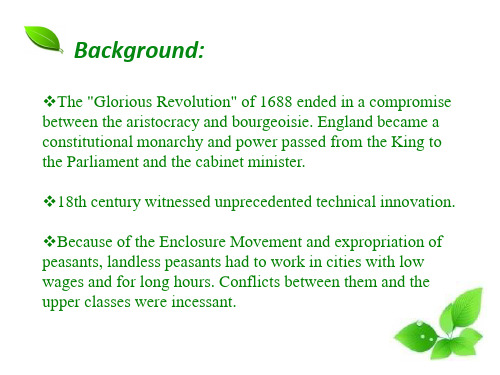
Masters and works:
Steel and Addison: The Sepectator (1711-1712) Alexander Pope:
-Essays Essay on Criticism (1711) The Rape of the Lock (1714) The Dunciad (1728-1742) Poems Essay of Man (1732-1734) Pope's Homer(translation): Iliad (1715-1720) Odyssey (1725-1726) Pope's Shakespeare (1725, edition)
Masterpieces:
The Rape of The Lock:
A mock-heroic narrative poem, first published anonymously in May 1712. The poem satirises a minor incident by comparing it to the epic world of the gods. It was based on an actual incident recounted by his friend - a fop at the court forcibly cut off a lock of curls of a pretty maid of honour and which caused a quarrel between the families and became the talk of London. Pope satirized the triviality and silliness of the high class with a delicate wit. Pope's most famous Poem.
18世纪英国文学分类
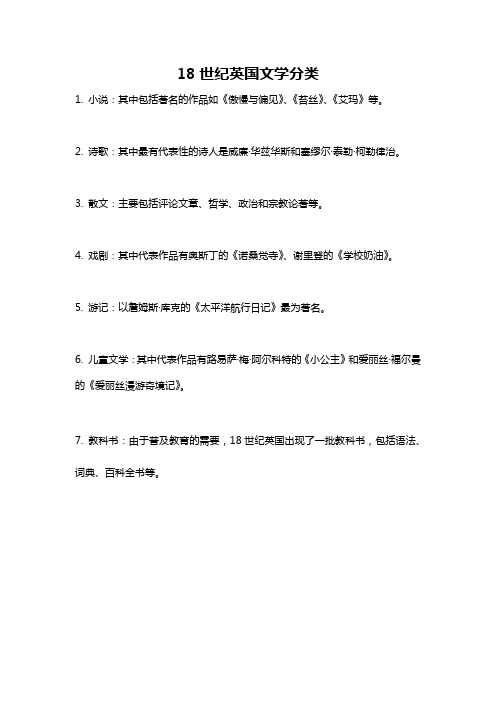
18世纪英国文学分类
1. 小说:其中包括著名的作品如《傲慢与偏见》、《苔丝》、《艾玛》等。
2. 诗歌:其中最有代表性的诗人是威廉·华兹华斯和塞缪尔·泰勒·柯勒律治。
3. 散文:主要包括评论文章、哲学、政治和宗教论著等。
4. 戏剧:其中代表作品有奥斯丁的《诺桑觉寺》、谢里登的《学校奶油》。
5. 游记:以詹姆斯·库克的《太平洋航行日记》最为著名。
6. 儿童文学:其中代表作品有路易萨·梅·阿尔科特的《小公主》和爱丽丝·福尔曼的《爱丽丝漫游奇境记》。
7. 教科书:由于普及教育的需要,18世纪英国出现了一批教科书,包括语法、词典、百科全书等。
18世纪的英国文学
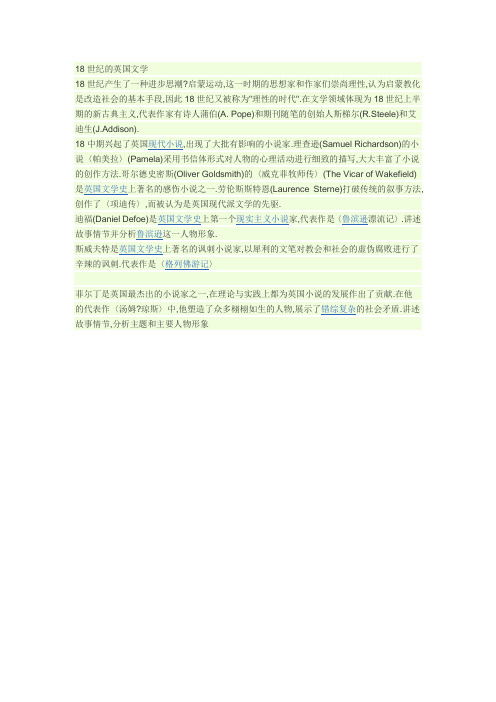
18世纪的英国文学
18世纪产生了一种进步思潮?启蒙运动,这一时期的思想家和作家们崇尚理性,认为启蒙教化是改造社会的基本手段,因此18世纪又被称为"理性的时代".在文学领域体现为18世纪上半期的新古典主义,代表作家有诗人蒲伯(A. Pope)和期刊随笔的创始人斯梯尔(R.Steele)和艾迪生(J.Addison).
18中期兴起了英国现代小说,出现了大批有影响的小说家.理查逊(Samuel Richardson)的小说〈帕美拉〉(Pamela)采用书信体形式对人物的心理活动进行细致的描写,大大丰富了小说的创作方法.哥尔德史密斯(Oliver Goldsmith)的〈威克菲牧师传〉(The Vicar of Wakefield)是英国文学史上著名的感伤小说之一.劳伦斯斯特恩(Laurence Sterne)打破传统的叙事方法,创作了〈项迪传〉,而被认为是英国现代派文学的先驱.
迪福(Daniel Defoe)是英国文学史上第一个现实主义小说家,代表作是〈鲁滨逊漂流记〉.讲述故事情节并分析鲁滨逊这一人物形象.
斯威夫特是英国文学史上著名的讽刺小说家,以犀利的文笔对教会和社会的虚伪腐败进行了辛辣的讽刺.代表作是〈格列佛游记〉
菲尔丁是英国最杰出的小说家之一,在理论与实践上都为英国小说的发展作出了贡献.在他
的代表作〈汤姆?琼斯〉中,他塑造了众多栩栩如生的人物,展示了错综复杂的社会矛盾.讲述故事情节,分析主题和主要人物形象。
18世纪英国文学
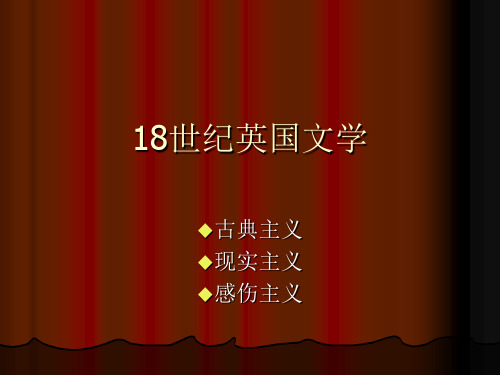
⑤
典型性
现实主义创作方法要求除了细节真实外, 现实主义创作方法要求除了细节真实外,还 要真实地再现典型环境中的典型人物, 要真实地再现典型环境中的典型人物,在小说 《汤姆·琼斯》中,菲尔丁运用对比手法成功塑造 汤姆·琼斯》 了同一类型而不同特点的一系列典型人物
身份的焦虑
英国学者威廉· 英国学者威廉·布洛姆在总结有关身份问题的最 近研究成果时简要概括到: 近研究成果时简要概括到:“身份确认对任何个人 来说, 来说,都是一个内在的、无意识的行为要求,个人 努力设法确认身份以获得心理安全感, 努力设法确认身份以获得心理安全感,也努力设法 维持、保护和巩固身份以维护和加强这种心理安 全感,后者对于个性稳定与心灵健康来说, 全感,后者对于个性稳定与心灵健康来说,有至关重 要的作用。从婴儿期到成年以至老年, 要的作用。从婴儿期到成年以至老年,身份确认这 一行为要求一直发挥着作用“ 一行为要求一直发挥着作用“。而一个人的身份 包括诸多层面,根据荷兰学者吉尔特· 包括诸多层面,根据荷兰学者吉尔特·霍夫斯塔德有 关文化身份的论述, 关文化身份的论述,一个人始终同时属于以下不同 层面或身份标志:如国家层面、地域/种族/信仰/ 层面或身份标志:如国家层面、地域/种族/信仰/语 言层面、性别层面、代的层面、阶级或身世层面、 组织或职业层面等等。
18世纪英国文学 18世纪英国文学
古典主义 现实主义 感伤主义
·知识点
18世纪英国启蒙文学的三个阶段 18世纪英国启蒙文学的三个阶段 现实主义小说的特点 重要作家作品:笛福《鲁滨逊漂流记》 重要作家作品:笛福《鲁滨逊漂流记》※ 斯威夫特《格列佛游记》 斯威夫特《格列佛游记》 理查生《帕米拉》 理查生《帕米拉》 菲尔丁《汤姆·琼斯》 菲尔丁《汤姆·琼斯》※ 斯泰恩《项笛传》 斯泰恩《项笛传》 扬格《夜思》 扬格《夜思》 格雷 《暮畔哀歌》 暮畔哀歌》 哥特式小说 感伤主义及其特点 “暮畔诗派” 暮畔诗派”
week7The Eighteenth Century English Literature--18世纪英国文学
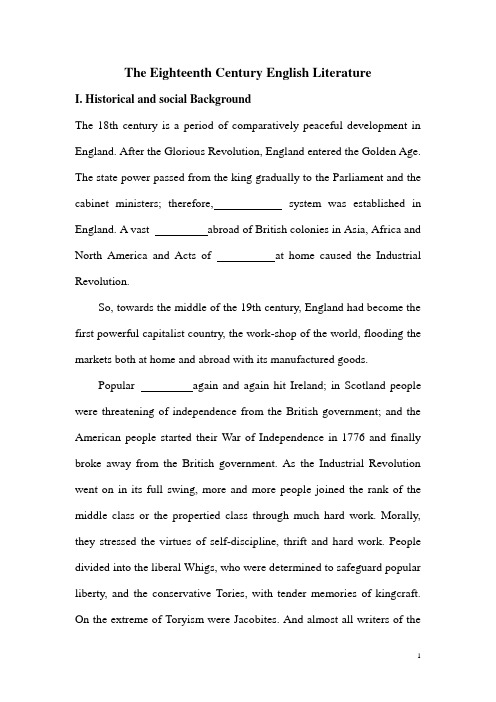
The Eighteenth Century English LiteratureI. Historical and social BackgroundThe 18th century is a period of comparatively peaceful development in England. After the Glorious Revolution, England entered the Golden Age. The state power passed from the king gradually to the Parliament and the cabinet ministers; therefore, system was established in England. A vast abroad of British colonies in Asia, Africa and North America and Acts of at home caused the Industrial Revolution.So, towards the middle of the 19th century, England had become the first powerful capitalist country, the work-shop of the world, flooding the markets both at home and abroad with its manufactured goods.Popular again and again hit Ireland; in Scotland people were threatening of independence from the British government; and the American people started their War of Independence in 1776 and finally broke away from the British government. As the Industrial Revolution went on in its full swing, more and more people joined the rank of the middle class or the propertied class through much hard work. Morally, they stressed the virtues of self-discipline, thrift and hard work. People divided into the liberal Whigs, who were determined to safeguard popular liberty, and the conservative Tories, with tender memories of kingcraft. On the extreme of Toryism were Jacobites. And almost all writers of theage were servants of Whigs or Tories during their competition.Ⅱ. Cultural Background1. EnlightenmentThe was a progressive intellectual movement throughout Western Europe in the 18th century. It was an expression of struggle of the bourgeoisie against feudalism. The enlighteners fought against class inequality, stagnation, prejudices and other survivals of feudalism. They thought the chief means for bettering the society was "enlightenment" or "education" for the people. The English enlighteners were bourgeois democratic thinkers. They set no revolutionary aim before them and what they strove for was to bring it to an end by clearing away the feudal ideas with the bourgeois ideology.Enlighteners fell into two groups-the group and the radical group. Moderate enlighteners supported the principles of the existing social order and considered that partial reforms would be sufficient. In this group may be included chiefly Alexander Pope, Joseph Addison and Richard Steele, Daniel Defoe and Samuel Richardson. They tried to work out a standard of moral conduct, which could be more suitable to the existing social conditions. Radical enlighteners struggled for more resolute democratization in the management of the government, and defended the interests of the exploited masses, the peasants and the working people in the cities. The representative writers of this group areJonathan Swift, Henry Fielding, Tobias George Smollett, Oliver Goldsmith and Richard Brinsley Sheridan. They stressed the discrepancy between what they called “the proper, moral standards”and the bourgeois-aristocratic society of their age.2. The influence of EnlightenmentInspired by the spirit of the Enlightenment, people were encouraged to cultivate a sound sense of rationality and a witty intellectuality. More schools were set up. The Copyright Act of 1709 made, for the first time in English history, literary creation an honorable and independent profession.Besides the popular forms of poetry, novel and drama, the period also saw the appearance of such popular press as pamphlets and newspapers and periodicals. And there was also the flourish of coffee houses and all kinds of social clubs, (about 2000 in London.) which greatly helped the cultivation and promotion of the new English culture.However, in the later part of the century, people began to feel discontented with the rigidity of rationality. A demand for a release of one's spontaneous feeling, a relaxation from the cold and rigid logic of rationality and an escape from, the inhuman Industrial Revolution gradually took shape in the form of sentimental and pre-romantic novel and poetry.Ⅲ. Characteristics of the LiteratureThe main literary stream of the 18th century was . What the writers described in their works were social realities. The main characters were usually common men. Most of the writers concentrated their attention on daily life. Literature included book, newspaper, magazine, and pamphlets. Prose had a rapid development in this age, so the 18th century was an age of prose.Novel writing made a big advance in this century. Along with the economic independence, the eighteenth-century writers enjoyed greater freedom in their creative activities and were now able to devote themselves to whatever interested them and to give utterance to whatever they thought right or proper. For the first time too, the literary tendency of the age was moving-away from the conventional romance stories about the life of the rich and noble people of the aristocratic class and turning to works that would give accounts of the common life of the ordinary folk.In this age was much used in writing. It refers to any writing, in poetry or prose, with the purpose to ridicule, censure(责难) and correct the vices, follies, stupidities and corruptions of the society, and to satirize their enemies.The development of the literature in this period can be summarized as: the predominance of neoclassical poetry and prose in the early decades of the 18th century; the rise and flourish of modern realistic novel in the middle years of the 18th century; and the appearance ofgothic novel and the sentimental and pre-romantic poetry and fiction in the last few decades of the 18th century.1. Neo-Classicism in English LiteratureIn early 18th century, writers of the neo-classical school were Addison, Steele and Pope. In the middle decades of the century, Samuel Johnson became the leader of the classical school in English poetry and prose.The classicists found their artistic models in the classical literature of the ancient Greek and Roman writers, and tried to control literary creation by some fixed laws and rules drawn from their works. In writing plays they used rimed instead of blank verse. They observed the three unities-the unities of time, place and action. They thought poetry should follow the ancient divisions, falling into lyric, epic, didactic, satiric or dramatic and each group should be guided by some peculiar principles. Prose should be precise, direct and flexible. They put the stress on the classical ideals of order, logic, restrained emotion, accuracy, good taste and decorum. Their works, mostly refined and perfect, are conscientious craftsmanship and often highly didactic. Neoclassical poetry reached its stylistic perfection during the period.A. Alexander Pope (1688-1744)a. A brief introduction of PopePope was the representative writer of the neo-classical school. He was a master in satire and heroic couplet and epigram. He popularized the neo-classical literary tradition. He was one of the early representatives of the Enlightenment, who introduced into English culture the spirit of rationalism and greater interest in the human world. He represented the highest glory and authority in matters of literary art and made great contributions to the theory and practice of prosody(诗学).b. Pope's Major Works:An Essay on Criticism《批评论》(1711), written in heroic couplet, was a manifesto of English neo-classicism. It sums up the art of poetry of old Greek and Roman.The Rape of the Lock《卷发遇劫记》(1714). A fop at the court forcibly cut off a lock of curls of a pretty maid of honor. In this poem the poet describes how a quarrel between two aristocratic families arose.It is a satire of the court life of that time.Essay on Man《人论》, written in her oic couplet, indicates the poet’s political and philosophical viewpoint. It deals with man’s relation to the universe, to society, to himself, and to happiness.The Dunciad《愚人志》is Pope’s famous satirical poem. It is full of bitter personal attacks on the poet’s personal enemies, and it also gives a broad satirical picture of the whole literary life in the early 18th century England.c. Pope’s epigram“Hills peep over hills, and Alps on Alps arise!”山外有山,天外有天。
18世纪的英国文学
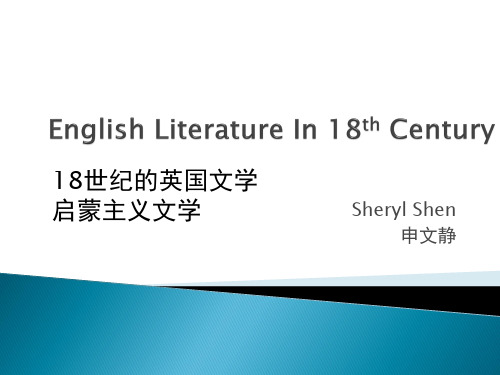
“假如一间铁屋子,是绝无窗户而万难破毁的,里 面有许多熟睡的人们,不久都要闷死了,然而是从 昏睡入死灭,并不感到就死的悲哀。现在你大嚷起 来,惊起了较为清醒的几个人,使这不幸的少数者 来受无可挽救的临终的苦楚,你倒以为对得起他们 么?”
“然而几个人既然起来,你不能说决没有毁坏 这铁屋的希望。”
All partial Evil, universal Good;
And spite of Pride, in erring Reason's spite, One truth is clear: Whatever is, is right (Alexander Pope: An Essay o n Man, To Henry St, John , lines 289~294)
For
ቤተ መጻሕፍቲ ባይዱ
fools rush in where angels fear to tread.
Fools
admire, but men of sense approve.
Why do people have to follow rules?
How do we understand “Those rules of old discover’d, not devis’d/Are Nature still, but Nature methodiz’d”?
A little learning is a dangerous thing. (from An Essay on Criticism)
To
err is human, to forgive, divine.
An
honest man is the noblest work of God.
18世纪英国文学社会历史背景

18世纪英国文学社会历史背景
18世纪英国文学的社会历史背景主要有以下几个方面:
1. 女性权益的觉醒:18世纪初,英国社会对待女性的态度开
始发生变化。
女性开始参与教育和文化领域,对于自身权益的争取也逐渐增加,这对于当时的文学创作产生了积极的影响。
2. 工业革命的兴起:18世纪是英国工业革命的起始阶段,工
业化带来了大规模的城市化和社会变迁。
这种社会变迁对于文学创作提供了丰富的素材,同时也反映了当时社会的不平等和冲突。
3. 绅士文化的兴盛:18世纪的英国社会以绅士文化为主导,
绅士对于文学的热衷和对于教养的要求成为当时文学创作的主要动力。
许多文学作品也通过对绅士的塑造和探讨,表现出当时社会的价值观和道德规范。
4. 政治变革的影响:18世纪初,英国历经了光荣革命和格洛
斯特议会革命,国家政治制度发生了较大的变化。
这些政治变革对于文学创作产生了巨大的影响,作家们开始关注社会政治问题,并用文学作品表达对政治体制的思考和批评。
5. 文化启蒙运动的影响:18世纪的英国是启蒙运动的时代,
启蒙思想家们强调理性、人权和知识的重要性。
这种思潮对文学创作产生了深远的影响,作家们开始关注个体的自由和权益,并试图通过文学来推动社会变革。
总的来说,18世纪英国文学的社会历史背景反映了当时社会的动荡与变迁,以及人们对于个体权益、道德观念和政治体制的关注和思考。
同时,文学作品也成为表达和探讨这些问题的重要途径。
18世纪英国文学社会历史背景

18世纪英国文学社会历史背景
18世纪英国文学的社会历史背景主要包括以下几个方面:
1. 工业革命:18世纪是英国工业革命的时期,这一时期的工业化和城市化迅速发展,社会经济结构发生了巨大变化。
工业革命带来了大规模的工厂和机器化生产,城市化加剧了人口流动和社会动荡,同时也加剧了阶级差距和社会不平等。
2. 新兴中产阶级的崛起:工业革命的推动下,新兴中产阶级崛起并逐渐成为社会的主要力量。
他们通过商业和工业活动积累了财富,成为了社会上的重要阶层。
这一阶级的出现带动了经济、政治和文化领域的变革,也为18世纪英国文学的发展提供了更广阔的舞台。
3. 政治改革和启蒙思想的兴起:18世纪英国经历了一系列的政治改革和思想启蒙运动。
这一时期,英国实行了宪政制度,政治权力逐渐从封建贵族转移到了议会和新兴中产阶级的手中。
启蒙思想家们提倡人的理性和自由,对传统权威和迷信进行了批判,这些思想在18世纪英国文学中得到了广泛的表达。
4. 文化和艺术的繁荣:18世纪英国文学迎来了一个繁荣的时期,出现了许多优秀的作家和作品。
这一时期,小说和戏剧成为文学的重要形式,作家们开始关注社会问题和人类内心的复杂性。
同时,期刊和报纸的兴起也为作家们提供了更广泛的读者群体和发表作品的平台。
总体来说,18世纪英国文学的社会历史背景是在工业革命和社会变革的大背景下,新兴中产阶级的崛起和政治改革的推动下,文学艺术得到了繁荣和发展。
同时,启蒙思想的兴起也为文学提供了新的思想和表达方式。
第十讲 十八世纪英国文学

1、讽刺统治集团内部的阴谋倾轧 小人国里复杂的权力争夺和宗教纠纷 2、对新思想和科学思潮、理性的讽刺 飞岛国的废物哲学家 飞岛国的奇特“科学研究” 慧马国的纯粹理性统治:yahoo(粗鲁、粗俗) 3、攻击英国对爱尔兰的奴役和海外殖民
(二)启蒙主义中期(18c.40s——50s):小说 成就最高 1、约翰逊(1709-1784):18世纪中后期英国
歌是英国新古典主义最高发展,把英雄双韵体推到近乎 完美的地步;代表作讽刺史诗《夺发记》
2、
(1661-1731):英国近代长篇小说奠基
人;代表作《鲁滨逊漂流记》
3、
(1667-1745 ):讽刺艺术大师;
代表作《格列佛游记》
1、叙事文学的悠久历史 2、 的产生:18世纪城市繁荣和市民阶层的兴起
(1741-1748)
1、故事情节:
a、帕美拉与B先生的引诱与被引诱 b、克拉丽莎逃婚,陷入拉夫雷斯的圈套 克拉丽莎被拉夫雷斯陷害,身心遭受重创 拉夫雷斯爱上克拉丽莎,克拉丽莎坚贞不屈
2、《帕美拉》与《克拉丽莎》在当时欧洲的影响:
a、菲尔丁的嘲弄 b、强烈的社会反响 c、狄德罗的盛赞;卢梭与歌德争相模仿
Robinson Crusoe 全 名:
《约克镇海员鲁滨逊〃克鲁索自述他的生涯及惊奇冒险;他独居美洲 海边奥龙诺克河口附近的荒岛上达28年,同舟者都于海难中丧生,鲁 滨逊〃克鲁索一人独自漂流岸上,侥幸余生;最后同样情节奇特,一 只海盗船将他从岛上救出》
新闻背景:1704年,一个叫亚历山大〃塞尔柯克的英格兰水手,因和 船长发生冲突,被遗弃在距智利海岸约500里的一个荒岛上,4年之后 获救
英国18世纪文学史(全文5篇)
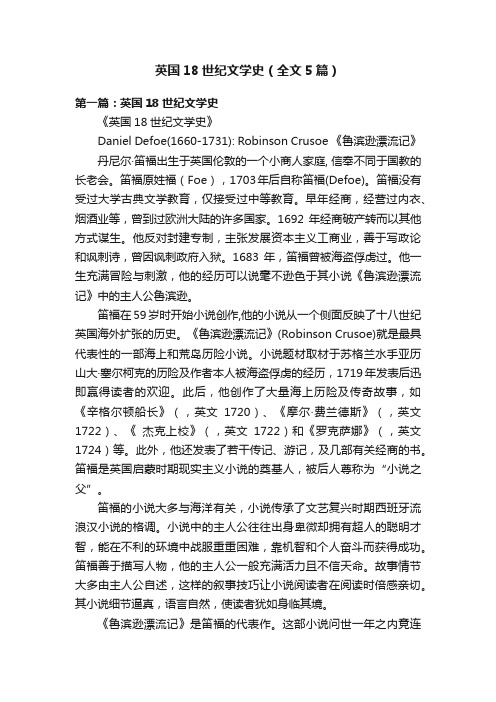
英国18世纪文学史(全文5篇)第一篇:英国18世纪文学史《英国18世纪文学史》Daniel Defoe(1660-1731): Robinson Crusoe 《鲁滨逊漂流记》丹尼尔·笛福出生于英国伦敦的一个小商人家庭, 信奉不同于国教的长老会。
笛福原姓福(Foe),1703年后自称笛福(Defoe)。
笛福没有受过大学古典文学教育,仅接受过中等教育。
早年经商,经营过内衣、烟酒业等,曾到过欧洲大陆的许多国家。
1692年经商破产转而以其他方式谋生。
他反对封建专制,主张发展资本主义工商业,善于写政论和讽刺诗,曾因讽刺政府入狱。
1683年,笛福曾被海盗俘虏过。
他一生充满冒险与刺激,他的经历可以说毫不逊色于其小说《鲁滨逊漂流记》中的主人公鲁滨逊。
笛福在59岁时开始小说创作,他的小说从一个侧面反映了十八世纪英国海外扩张的历史。
《鲁滨逊漂流记》(Robinson Crusoe)就是最具代表性的一部海上和荒岛历险小说。
小说题材取材于苏格兰水手亚历山大·塞尔柯克的历险及作者本人被海盗俘虏的经历,1719年发表后迅即赢得读者的欢迎。
此后,他创作了大量海上历险及传奇故事,如《辛格尔顿船长》(,英文1720)、《摩尔·费兰德斯》(,英文1722)、《杰克上校》(,英文1722)和《罗克萨娜》(,英文1724)等。
此外,他还发表了若干传记、游记,及几部有关经商的书。
笛福是英国启蒙时期现实主义小说的奠基人,被后人尊称为“小说之父”。
笛福的小说大多与海洋有关,小说传承了文艺复兴时期西班牙流浪汉小说的格调。
小说中的主人公往往出身卑微却拥有超人的聪明才智,能在不利的环境中战服重重困难,靠机智和个人奋斗而获得成功。
笛福善于描写人物,他的主人公一般充满活力且不信天命。
故事情节大多由主人公自述,这样的叙事技巧让小说阅读者在阅读时倍感亲切。
其小说细节逼真,语言自然,使读者犹如身临其境。
《鲁滨逊漂流记》是笛福的代表作。
英国文学之18世纪PPT42页

41、实际上,我们想要的不是针对犯 罪的法 律,而 是针对 疯狂的 法律。 ——马 克·吐温 42、法律的力量应当跟随着公民,就 像影子 跟随着 身体一 样。— —贝卡 利亚 43、法律和制度必须跟上人类思想进 步。— —杰弗 逊 44、人类受制于法律,法律受制于情 理。— —托·富 勒
45、法律的制定是为了保证每一个人 自由发 挥自己 的才能 ,而不 是为了 束缚他 的才能 。—— 罗伯斯 庇尔
谢谢
11、越是没有本领的就越加自命不凡。——邓拓 12、越是无能的人,越喜欢挑剔别人的错儿。——爱尔兰 13、知人者智,自知者明。胜人者有力,自胜者强。——老子 14、意志坚强的人能把世界放在手中像泥块一样任意揉捏。——歌德 15、最具挑战性的挑战莫过于
- 1、下载文档前请自行甄别文档内容的完整性,平台不提供额外的编辑、内容补充、找答案等附加服务。
- 2、"仅部分预览"的文档,不可在线预览部分如存在完整性等问题,可反馈申请退款(可完整预览的文档不适用该条件!)。
- 3、如文档侵犯您的权益,请联系客服反馈,我们会尽快为您处理(人工客服工作时间:9:00-18:30)。
Robert Burns
• Sentimentalism embraces a pessimistic outlook and blames reason and the Industrial Revolution for the miseries and injustices in the aristocraticbourgeois society and indulges in sentiment. • Gray, Goldsmith, Sterne
Gulliver’s Travels ’
•A work which censures folly or wickedness. G. T is an incisive and unparalleled satirical depiction of the vices of his age.
Jonathan Swift (1667-1754)
Henry Fielding (1707-1754)
Tom Jones
• Story • A landmark of English literature (1707-1754)
Tom Jones WHAT HOW Genre: picaresque novel 流浪汉小说 Tom Jones’ adventures help present a panoramic view of the 18th century English country and city life.
background
Enlightenment
P165 an expression of struggle of bourgeoisie against feudalism Reason the reasoning of men could free them of their ills and lead them to peace, security, a good government and ideal society. “All our knowledge begins with the senses, proceeds then to the understanding, and ends with reason. There is nothing higher than reason.” (Kant)
Daniel Defoe(1661-1731)
works
The Shortest Way with the Dissenter 《消灭不同教派的捷径》 Hymn to the Pillory 《枷刑颂》 Captain Singleton Moll Flanders Robinson Crusoe
Daniel Defoe(1661-1731)
Robinson Crusoe • • • • • • strong will power adventurous inexhaustible energy hardworking intelligent prototype: pioneer colonist; capitalist (businessman) • Crusoe is an embodiment of the spirit of individual enterprise and colonial expansion of the rising bourgeoisie.
Daniel Defoe(1661-1731)
life
• Foe—Defoe • jack-of-all-trade • a radical nonconformist(不信奉英 国国教者) in religion • a journalist and pamphleteer (instinct for "good story") • imprisonment
Henry Fielding (1707-1754)
Life and Works
• Born in a rich family • Educated at Eton and University of Leyden • Married in 1735 • Joseph Andrews (1742) • Justice of the peace for Westminster in 1748 • Tom Jones (1749) • Amelia (1751) • Left England for Portugal in 1754 • Died the same year in Lisbon
Literature: general introduction
novel
Daniel Defoe Henry Fielding Tobias George Smollet Roderick Random (兰登传) Samuel Richardson Pamela (帕梅拉);Clarissa (克拉丽莎) Jonathan Swift Oliver Goldsmith Laurence Sterne Tristran Shandy; Sentimental Journey Horace Walpole The Castle of Otranto (奥特朗托堡) Gothic novel (哥特小说): story of horror (violence; horror; supernatural)
a panoramic view of English society Satirize aristocratic hypocrisy and eulogize the simplicity of common people.
Henry Fielding (1707-1754)
• A prose Homer • “Father of English Novel”
His Style
• A storyteller: a gift for organizing details so vividly that his stories are both credible and fascinating.
Jonathan Swift (1667-1754)
Life and Works • • • • • • • • • • Born a posthumorous child in 1667 Educated at Dublin University As a private secretary for 10 years The Battle of the Books(书战 ) The Tale of a Tub (木桶的故事) Became a satire-writing dictator Dean of St. Patrick’s Cathedral (Dublin) Gulliver’s Travels(格列佛游记)(1726) Afflicted with a brain disorder Died in 1745
• He fought against cannibal savages coming from the neighbouring islands.
• Later he rescued one savage from death and named him Friday.
• In the hope of returning to Europe, he built a boat.
Part VI The 18th Century
background
Political Changes
"a period of a comparatively peaceful development" 1688 Glorious Revolution: end of struggle for political freedom (Bill of Rights: stamped out any possibility of a Catholic monarchy, and ended moves towards absolute monarchy) enlightenment: P165 an expression of struggle of bourgeoisie against feudalism
• Finally an English ship came and took him to Europe.
The Theme
• From an individual laborer to a master and colonizer, Crusoe seems to have gone through various stages of human civilization, creating a visual picture that manifests how man’s history has developed from the primitive to the feudal, and then to the capitalistic in the 18th century.
Part VI. 18th Century (2)
《辛格尔顿船长》 《摩尔·费兰德斯》
《鲁滨逊漂流记》
Journal of the Plague Year
《大疫年日记》
Robinson Crusoe
• On the voyage to Africa to buy slaves he met with the most unfortunate shipwreck.
• Being cast on an island, he decided to stay there and managed his livelihood for himself.
